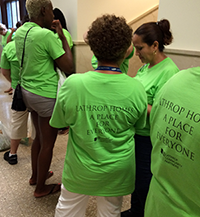The city of Chicago has cleared another hurdle to win a special taxing district to help fund a redevelopment of Lathrop Homes.
Mayorally-appointed members of the Community Development Commission (CDC) met on Tuesday, July 12, 2016 in City Council chambers. The commission unanimously approved tax-increment financing for the redevelopment of the public housing complex.
Tuesday's action is rooted in last April's proposal by the city to use property taxes to fund the private redevelopment. Lathrop is a mostly-vacant, 900-unit site along the North Branch of the Chicago River at Diversey Avenue.
The apartment complex is currently owned by the Chicago Housing Authority (CHA), and contains no privately-owned residences—so it's never generated property taxes.
But because part of the new development would contain market-rate rental apartments and commercial units, officials say it would produce property-tax revenue.
The city has proposed a special district to surround two-thirds of Lathrop that would divert its property taxes away from local governments, and instead be used to repay developers' construction loans. Such an arrangement is called tax-increment financing (TIF).
State law compels the city, before it can enact a TIF district, to seek approval in a series of acronym-laden public meetings—the fourth of which, in this case, is that of the CDC.
One of the three developers on the project, Bickerdike Redevelopment Corporation, bused several dozen supporters into the Tuesday meeting. All wore bright green t-shirts that said "Lathrop Homes—a place for everyone" and displayed the developers' names.
During a public comment period, green-shirted speakers gave scripted support to the project. But several speakers urged commissioners not to approve the TIF district.

Bused-in Lathrop redevelopment supporters
Rev. Bruce Ray, pastor of Kimball Avenue Church, said that the CHA had already received an excessive amount of federal tax dollars to operate Lathrop while the agency drove the complex to become largely vacant.
Now, said Ray, the CHA is "coming and asking for TIF funds, which is more public money."
The CHA, Ray said, "did not take care of Lathrop Homes . . . I should not have to pay taxes again in order to see this redevelopment happen."
Another speaker, self-described neighbor and educator Dena Giacometti, warned commissioners that they city was asking "to approve something unprecedented: two TIF districts for one development."
Giacometti was referring to the city's revelation that it will seek additional TIF funding for a later phase of Lathrop redevelopment, south of the current project.
She urged commissioners "to ask some overall questions for the TIF on this site: How much [property tax revenue] is the second TIF going to generate? What will it fund? Are we correct to assume that the developers are counting on it to fund the construction of four brand-new city streets at the south end of Lathrop and all the related utilities?"
Ald. Joe Moreno, in whose 1st Ward the project resides, asked commissioners to guarantee an early sunset for the TIF district—a provision unprecedented among Chicago's 100-plus TIF districts.
By state law, Chicago can have each TIF district siphon property taxes for 23 years without interruption.
Moreno asked CDC members to recommend to the Chicago City Council that the Lathrop district end within 120 days after it achieves its stated subsidy to developers—which is $17.5 million.
That's the amount that a city report asserted that the Lathrop district would generate in 23 years.
The assertion prompted this question to a planning department staffer from CDC member Eileen Rhodes: "So if that happens in year six, because [the district accumulates property taxes more quickly] than expected, then it would terminate?"
"That's right," said the staffer.
The commission approved Moreno's request, though a written version of the sunset guarantee was not available at press time.
Also at Tuesday's meeting, the city's planning department announced a public meeting regarding tax credits that the Lathrop developers had counted on, but that appear to be in jeopardy.
The developers qualify for tax credits for restoring Lathrop buildings because the site is on the National Register of Historic Places.
However, the National Park Service has balked at approving the tax credits.
A planning department staffer said only that an August 1 meeting would be held "to discuss section 106 of the National Historic Preservation Act of 1966 as it relates to the housing project and the developer's application for historic tax credits," but didn't say where, at what time, or why.
A planning department spokesman could not immediately provide details.






